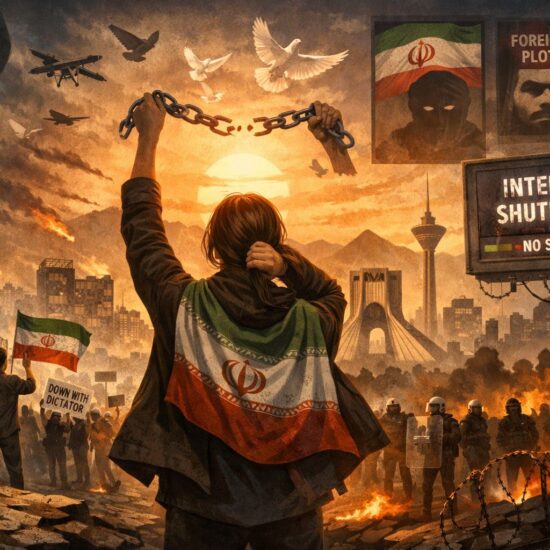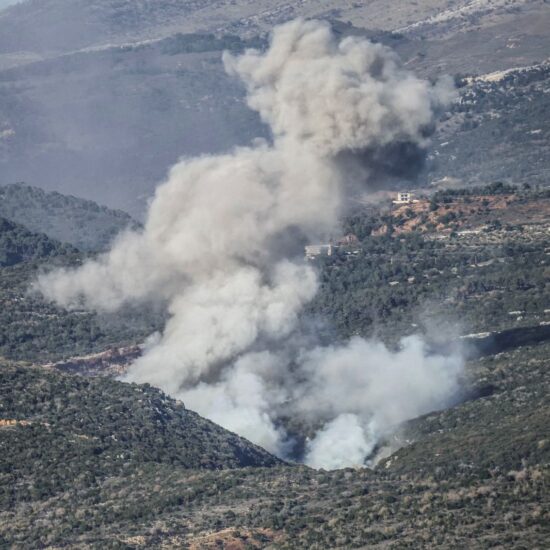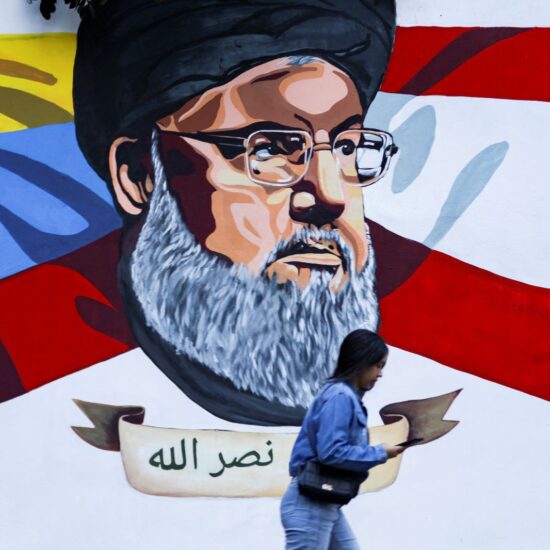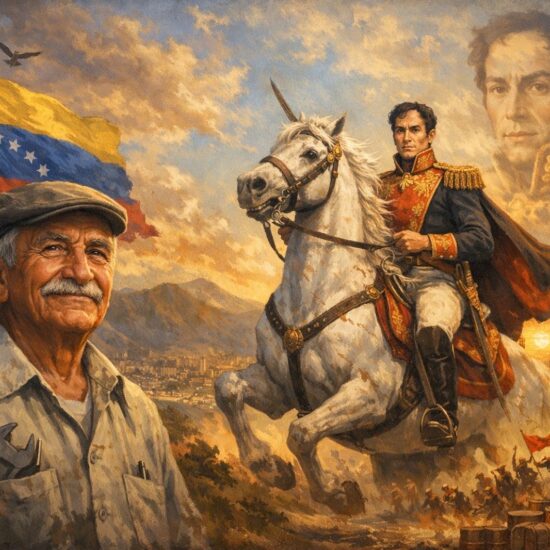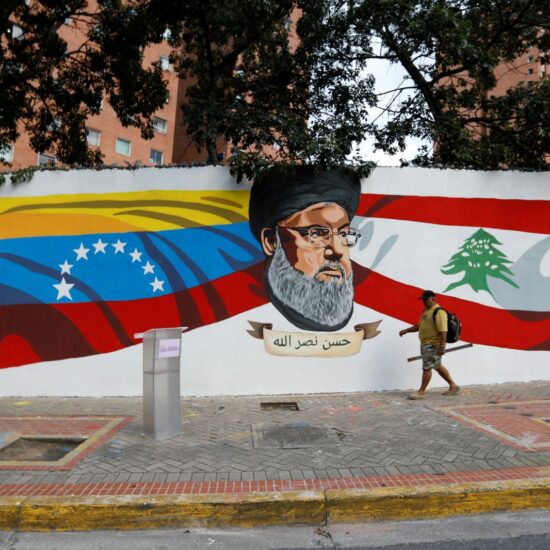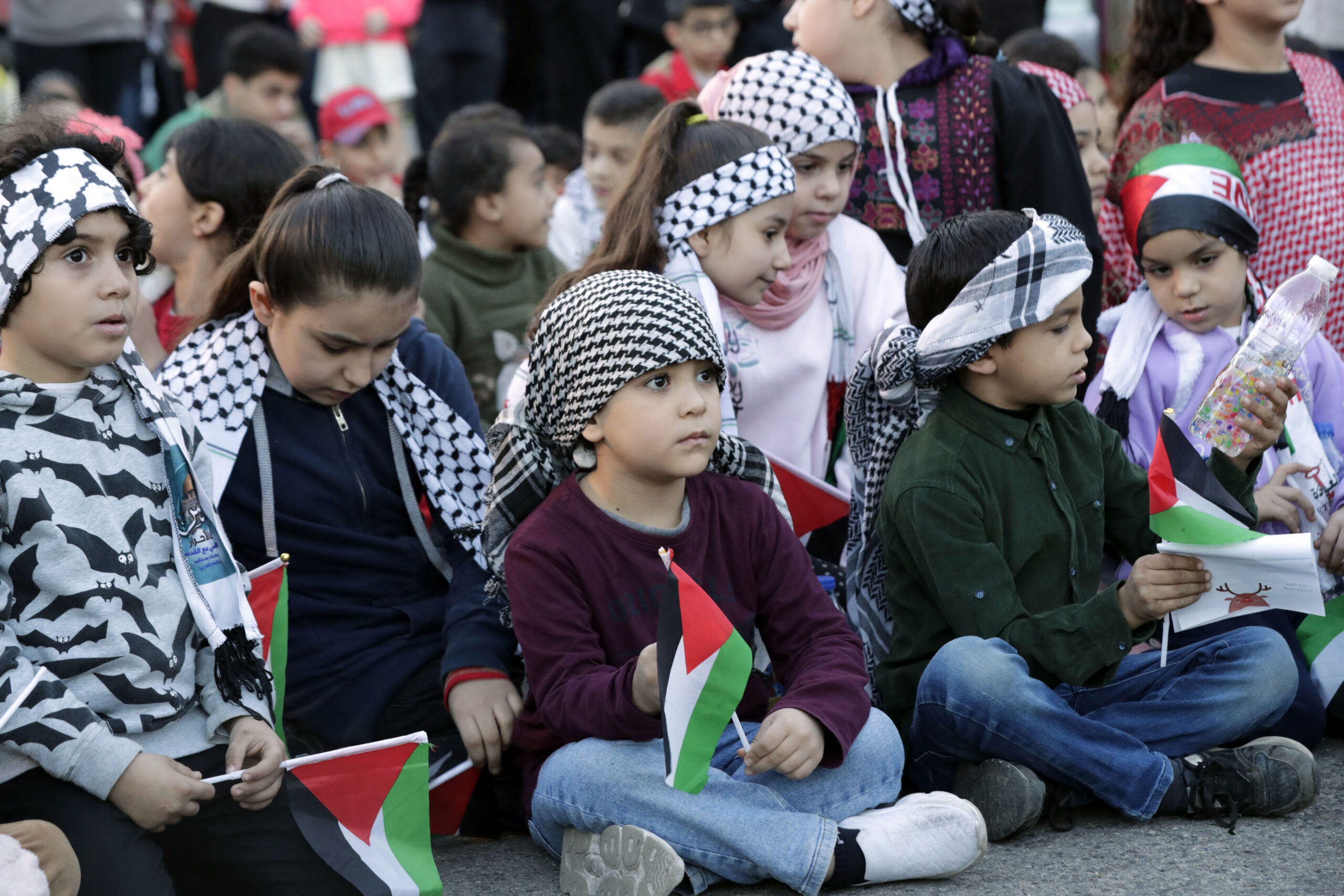
Christmas celebrations cancelled in Jesus’ birthplace, Hezbollah to speak, IRGC high commander killed in an Israeli strike in Syria, Deadly rain hitting Lebanon, Back into recession for Lebanese fragile economy, Lebanese Ba’ath Secretary-General takes Assad’s Syria as a path to mirror, The neutrality of Lebanese identity, Gaza without hospitals, UNSC resolution boosting humanitarian aid to the Strip, New war front opening on the Arabian Sea, Bahrain joins US-led coalition to provide maritime security in the Red Sea, The Chinese chessboard and Saudi-Iranian relations, Iraq votes for council elections for the first time in a decade, The forgotten war in Sudan
This Christmas, in Gaza, the Palestinian Christian community is at risk of extinction. Palestinian Christians say there are only 800 of them left in Gaza, as the Israeli genocidal campaign continues without sign of end.
Constituting the oldest Christian community in the world, dating back to the first century, Palestinian Christians have a special attachment to their land, considering the region is the birthplace of their faith, as well as the setting for many events in the Old and New Testaments of the Bible.
Gaza, in particular, is home to many significant sites in Christianity, as the region is referred to by name in the New Testament in Acts 8, which refers to Philip the Evangelist baptizing a man from Ethiopia on the road between Jerusalem and Gaza. Later in the fourth century, located along a major trade route with access to a vibrant port and a cosmopolitan city, it became a major Christian mission hub. After 1948, with the establishment of the state of Israel and the forced displacement of about 800,000 Palestinians – the Nakba -, more Palestinian Christians joined the community on the coastal enclave as refugees.
Estimates have indicated that the number of Christians in Gaza dropped in recent years from the 3,000 registered in 2007, when Hamas assumed complete control of the Strip, triggering Israel’s blockade and accelerating the departure of Christians from the poverty-stricken enclave, dwindling the number to around 1,000.
And although the sense of insecurity for Palestinians besieged in Gaza does not depend on sectarian factors, the already fragile Christian community in the Strip was directly targeted by an Israeli attack on October 19, when Israel bombed the Church of Saint Porphyrius, Gaza’s oldest, killing at least 18 people, and claiming in a statement that the church was not the target of the attack. However, daily witnessing of the last months’ indiscriminate attacks on Palestinian civilians easily questions any Israeli declarations.
Two days earlier, on October 17, an explosion at Al-Ahli Arab Hospital – an Anglican institution located a few blocks away – killed and injured hundreds, according to Palestinian health authorities. Hamas blamed the blast on an Israeli air raid, while Israeli officials claimed it was caused by a malfunctioning rocket fired by Gaza-based group Palestinian Islamic Jihad (PIJ), later denied by an investigation carried by the Forensic Architecture.
Between December 16 and 17, Israeli tanks surrounded the Holy Family’s church and snipers took up positions around it: there, a woman and her parishioner’s daughter were brutally killed. The Young Men’s Christian Association (YMCA) was also reportedly struck on the morning of December 16, killing six Palestinians and injuring many others, while some 250 IDPs were sheltering in the premises at the time.
The page Hidden Palestine posted on its social media accounts Gaza’s Christmas tree lighting in 2021 at the YMCA courtyard, as a reminder “not to believe Israeli propaganda trying to claim that Christmas was banned in Gaza or to portray Gaza as devoid of Christians,” the post reads, stating that “the annual Christmas tree lighting at the YMCA is attended by hundreds of Christians and Muslims.” However, this year, as three Christian churches have been bombed by Israel and dozens of Christians killed, both in airstrikes and by Israeli snipers, there have not been celebrations, neither in Gaza nor in Bethlehem, Jesus’ birthplace.
Earlier this month, it was announced that there would be no Christmas lights in Bethlehem, festive parades in Jerusalem, or celebrations in Jordan and Syria due to Israel’s atrocious bombing of Gaza. Many diaspora Palestinians also took the decision to refrain from celebrating this year, feeling it was inappropriate, while war in south Lebanon casted a long shadow over celebrations. In solidarity with the Palestinians in Gaza, Bethlehem’s municipality has set up an installation titled “Nativity under the Rubble” in Manger Square, a spot typically adorned with a festive Christmas tree, portraying the nativity scene set against the backdrop of a destroyed building, reflecting the hardships and affliction endured by the people of Gaza.
“This is a message to the whole world that the whole world is celebrating Christmas, but not Bethlehem. Bethlehem this year is celebrating Christmas in a different way with a message to the whole world that Palestine is suffering. That Bethlehem is suffering. That Bethlehem is celebrating Christmas from the rubble. Not like all other people in the world,” Rula Maayah, the Palestinian Minister of Tourism, said, her words being echoed by Pope Francis’ ones, who during Christmas Eve’s mass on Sunday lamented that Jesus’ message of peace is being drowned out by the “futile logic of war” in the very land where he was born.
In Lebanon
Hezbollah to speak: Secretary-General of Hezbollah, Sayyed Hassan Nasrallah, will speak on Wednesday, January 3, 2024, at 6:00 pm, during the commemorative ceremony held by the party on the fourth anniversary of the killing of top commanders General Qassem Suleimani and Abu Mahdi Al-Muhandis, Hezbollah-affiliated channel Al-Manara reported, citing Sunday’s announcement by Nasrallah’s media relations office.
Former head of IRGC’s Quds Force General Qassem Suleimani and former deputy chief of Iraq’s Hashd Shaabi paramilitary force Abu Mahdi Al-Muhandis were targeted by a US drone strike, ordered by former president Donald Trump, near Baghdad Airport on January 3, 2020. Nasrallah, who met General Suleimani in Beirut two days before his assassination, delivered a speech immediately after the strike where he vowed retaliation against US forces in the region, stressing the urgency for their withdrawal.
In addition to the commemoration of the aforementioned commanders and that of the recently killed Sayyed Razi Mousavi – the IRGC senior commander in Syria killed on Monday in an Israeli air strike in Damascus -, the latest developments of the Israeli war on Gaza and the ongoing military confrontations on the southern borders will likely take a big portion of the speech.
In this regard, several Hezbollah officials have spoken during the past week on the regional security situation in relation to Israel. The party’s parliamentary bloc head MP Mohamad Raad, calling the IDF a “killing army,” noted that the war’s main outcome is the revelation of the true face of the Israelis in front of the Western world, the hypocrisy of its democratic institution, and its “savage” nature. Moreover, during a memorial ceremony for one of the party’s fallen fighters, central council member Nabil Qaouk stressed the intended continuance of Hezbollah’s military operations in Lebanon, aimed at the protection of civilians, in line with the other Iran-affiliated militias in Iraq and Yemen. Lastly, Hashem Safieddine, chairman of Hezbollah’s executive council, during another ceremony honoring militiamen killed in Burj al-Chemali, in Sour district, highlighted the importance of the attacks in northern Israel in light of the growing discomfort among the US, Israel and the West with the status quo in south Lebanon.
The speeches come at a time when the number of civilians killed in south Lebanon continues to increase, as Thursday was tragically marked by the killing of a 75-year old woman due to an Israeli strike in the village of Maroun al-Ras.
Neutral identity: During Sunday mass in the church of Our Lady in Bkirki, Maronite Patriarch, Cardinal Bechara Boutros al-Rahi, presided over the celebration, dedicating the sermon to the apology of Lebanon’s neutrality.
Highly contradictory if compared to the statements of the Shiite Hezbollah, al-Rahi stressed the necessity for the country to return to its “positive stand of active neutrality in its message, as a land of convergence and dialogue, as a player with a role in resolving conflicts through peaceful means, and as a defender through diplomatic means of stolen rights in any Arab country, at the forefront of which are the rights of the Palestinian people to return to their land and establish their special state,” the National News Agency reported.
He continued, claiming that Lebanon’s neutrality is not “something new or innovative, but rather it is at the core of the country’s identity,” dating back to 1860, the time of the Mutasarrifiyah; to the eve of the declaration of the State of Greater Lebanon, on 1920; and to the promulgation of the National Charter in 1943, “so that Lebanon would enjoy complete independence from Western and Arab countries, with no guardianship, no protection, no privilege, and no extraordinary position for any country.”
Unprepared: On Saturday, heavy rainfall in the Zgharta region of northern Lebanon caused a landslide, killing four Syrian refugee children after part of their home was submerged with mud. The downpour that hit the country also flooded homes, damaged the Sacre Coeur Hospital in Hazmieh, and disrupted the public water supply in Mount Lebanon and Beirut, where part of a house in the neighborhood of Moseitbeh collapsed and a car crushed, without causing any injuries.
No region in Lebanon was spared from the torrents and floods, starting from the Abu Ali River in the north and passing through the Jaj River in Jbeil, Nahr Al-Kalb, the Beirut River, and the Ghadir River. In the Chouf region, rocks and street walls collapsed, houses and several cars were damaged, and the roads in the city of Tyre in the south turned into swamps. Moreover, the Lebanese Civil Defense said its personnel rescued 64 students trapped by the torrents in two buses between Nahr Al-Kalb and Jounieh, two of whom were hospitalised.
The low-pressure system affecting Lebanon, peaking on Friday night and Saturday, has brought cold air masses, a temperature drop, heavy rains, scattered snow, and strong winds reaching 90 kph in some areas. Streets and highways were inundated with unprecedented amounts of water, which the storm drains could not handle.
The flood crisis has emerged as Lebanon grapples with deteriorating infrastructure due to administrative corruption and a need for more maintenance. However, officials in public institutions traded blame over the matter.
Caretaker Public Works Minister Ali Hamieh said his ministry was not responsible for isolating and cleaning the river’s course, a task that falls under the Ministry of Economy’s responsibilities. At the same time, according to caretaker Energy Minister Walid Fayyad, Lebanon’s unprepared infrastructure, which cannot sustain severe torrential rains, is to blame.
Mirroring Syria’s path: On Thursday, December 21, members of the central leadership of the Arab Socialist Ba’ath Party in Lebanon, headed by Secretary-General Ali Hijazi, were received in Damascus by Syrian President, Bashar al-Assad.
Hijazi, who had previously manifested the Lebanese Ba’ath party’s intention to actively participate in the military confrontation with Israel – stating that many of the people fighting for Palestine today had trained in Syria or carry Syrian weapons – stressed the “brotherly relation” binding the two countries, as well as the necessity of fortifying it for the benefit of both peoples, the National News Agency reported.
“The parties bear a great responsibility in strengthening relations between the peoples, in addition to their role in defending national issues. Thus, all national forces in Lebanon had a role in firming up the fraternal ties between Syria and Lebanon,” President al-Assad said during the meeting, pointing out that what threatens Lebanon threatens Syria, and that the stability of Lebanon contributes to the stability of Syria as well.
Assad also claimed that Syria has successfully overcome its recent crisis by focusing on the rebuilding of its economy. On his side, Hijazi emphasized the need for Lebanon to adopt a similar approach in dealing with its challenges.
Though, the path towards Lebanon’s prosperity and stability – if really committed to the steadfast welfare of its people, rather than to their oppression – not only should carefully consider taking the Syrian regime as a model, but also – and primarily – should focus on the protection of the 1.5 million Syrian refugees’ community in the country, made more vulnerable by recent policies and campaigns of forced deportations, despite Lebanon not being legally entitled to return any refugee who may be at risk.
In fact, after that, on December 12, Lebanese Prime Minister Najib Mikati announced that the UNHCR handed over the data concerning Syrian refugees in Lebanon to the Lebanese General Security, new concerns have risen on the reliability of the Lebanese government. After several discussions about the technical methods of data sharing, the UNHCR decided to transfer the basic data of Syrian refugees in Lebanon in one batch, aiming at enhancing the existing cooperation in issues such as securing services like civil documents and legal residence, as well as facilitating the resettlement process to third countries, all under the international protection laws and standards for data protection.
Therefore, the Lebanese government affirmed that it is committed to not using any shared data for purposes conflicting with international law or disclosing it to any third party, including the country of origin. It also reiterated its commitment to the principle of non-refoulment and its obligations under international law.
However, while the latter commitment has already proven to be unreliable, as far as the former is concerned, the president of the Lebanese Center for Human Rights, Wadih al-Asmar, warned against handing over these lists to the Syrian regime, as data management in the Lebanese state might not be trustworthy.
Back into recession: According to the latest World Bank Lebanon Economic Monitor released on Thursday, the spillover effects from the war in Gaza pose yet another large shock to Lebanon’s precarious growth model. Without the implementation of a comprehensive crisis resolution plan, no long-term investment is feasible, and the country’s physical, human, social, and natural capital will be further eroded, the report said.
Before the outbreak of the ongoing Israel-Hamas war on October 7, the World Bank had projected that Lebanon’s economy would grow in 2023, by a meagre 0.2%, for the first time since 2018, mainly sustained by remittances sent from Lebanese working abroad and by an uptick in tourism. However, since the war began and reached south Lebanon, with fears of an escalation to a full-scale war, the ripple effects of insecurity are knocking Lebanon’s fragile economy back into recession.
Data analyzed by the World Bank in the Economic Monitor report shows that the percentage of scheduled flights to Lebanon that were actually completed plummeted from 98.8% on October 7 to 63.3% on November 4. Arrivals have picked up as the low-level conflict on the border did not immediately escalate and as many Lebanese living abroad came home for the holidays. However, the World Bank, basing on the assumption that the border conflict will continue at its current level without any major escalation by the end of the year, projected that instead of growing slightly in 2023, Lebanon’s GDP will shrink by -0.6% to -0.9%.
“Lebanon’s reliance on tourism and remittance inflows is neither a viable economic strategy nor an economic crisis resolution plan,” the report noted. “Because tourism tends to be volatile and subject to external and internal shocks, the sector cannot substitute for more sustainable and diverse drivers of growth.”
The Central Bank has initiated limited but encouraging reforms amid the relative stabilization of the exchange rate. However, fundamental changes to bank supervision and the conduct of monetary and exchange rate policies have yet to be introduced. In April 2022, Lebanon reached a preliminary deal with the International Monetary Fund for a $3 billion rescue package, but has not completed most of the reforms required to finalize it. The continued absence of an equitable banking resolution that comprises an upfront allocation of losses, bail-ins and restructuring continues to undermine prospects for recovery.
In The Region
Vowing retribution: Senior Islamic Revolutionary Guard Corps (IRGC) commander Seyyed Razi Mousavi was killed in an Israeli airstrike on Damascus on Monday. Unconfirmed reports from Iranian opposition media propose that Mousavi played a crucial role in coordinating financial and logistical support from Tehran to Iranian proxies in Syria.
Iran’s state television interrupted its regular news broadcast to announce that Mousavi had been killed, describing him as one of the oldest IRGC commanders in Syria, close to the commander of the IRGC’s elite Quds Force, General Qassem Soleimani, killed in a US drone attack in Iraq on January 3, 2020.
Mousavi was killed after the Israeli Forces launched three missiles at his position in the Set Zaynab area in the Damascus countryside, not far from the frequently targeted Damascus International Airport, as reported by an Al Mayadeen correspondent, while Israel has neither confirmed nor denied the claims.
Iranian President Ebrahim Raisi, in a message of condolence released following the news, said that Israel would pay for killing Mousavi, stating that “undoubtedly, the usurper and savage Zionist regime will pay for this crime,” the President said in a statement read on state TV. “This action is another sign of frustration, helplessness, and inability of the occupying Zionist regime.” The Iranian Foreign Ministry released a statement on Monday evening, warning that Tehran “reserves the right to respond at the appropriate time and place to the assassination” of Mousavi.
Negotiated humanity: Since the beginning of the week, diplomatic efforts have been continuing on several fronts to work on a new truce and deliver humanitarian aid to Gaza, repetitively stalled by US vetoes. Meanwhile, on Wednesday, Qatar-based Hamas leader Ismail Haniyeh travelled to Cairo to discuss a new temporary one-week truce in exchange for the release of 40 Israeli prisoners: including women, children, and men.
Qatar and the United States are also trying to build a dialogue with Israel to reach a truce allowing the release of hostages. A meeting of Qatar’s premier and the heads of the Israeli Mossad spy agency and US Central Intelligence Agency, held on Monday in Warsaw, Poland, on steps to free further hostages held by Hamas, was “positive but no deal is imminent,” a source briefed on the diplomatic efforts told Reuters.
Meanwhile, postponed because of US power to veto, the proposed UN Security Council’s resolution aimed at boosting the delivery of humanitarian aid to the besieged enclave was adopted on Friday, December 22. The resolution, drafted by the United Arab Emirates and adopted with US and Russia’s abstentions, calls for urgent steps to immediately allow “safe, unhindered, and expanded humanitarian access and to create the conditions for a sustainable cessation of hostilities.”
While the 10 of the 15 council members would have favored an initial draft that called for “an urgent and sustainable cessation of hostilities” to allow aid access, the US and Israel oppose a ceasefire, believing it would only benefit Hamas. Washington, on its hand, supports pauses in fighting to protect civilians and free hostages taken by Hamas.
Moreover, the resolution failed in its initial aim of diluting Israel’s control over all aid deliveries to the population of Gaza: the occupying power in fact has control and monitoring power of the Rafah crossing and the Kerem Shalom one, the only two operating accesses to the Strip. In this regard, Israel’s deputy UN Ambassador Jonathan Miller told the council that any enhancement of UN aid monitoring “cannot be done at the expense of Israel’s security inspection.”
Massively hindered by the Israeli army’s military operation, the distribution of humanitarian aid inside the Gaza Strip would be facilitated by the establishment of a monitoring mechanism by countries not party to the war, as proposed by UN Secretary-General Antonio Guterres. Though, a toned-down compromise was reached to instead ask Guterres to appoint a senior humanitarian and reconstruction coordinator to establish a UN mechanism for accelerating aid to Gaza through states that are not party to the conflict. The coordinator would also have responsibility “for facilitating, coordinating, monitoring, and verifying in Gaza, as appropriate, the humanitarian nature” of all the aid.
War on hospitals: Most people in Gaza are continuing being driven from their homes and UN officials have furtherly warned of a humanitarian catastrophe. The World Food Programme (WFP) says half of Gaza’s population is starving and only 10% of the food required has entered Gaza since October 7, while the World Health Organization (WHO) has announced that northern Gaza has been left without a functional hospital due to a lack of fuel, staff and supplies.
“There are actually no functional hospitals left in the north,” said Richard Peeperkorn, WHO representative in Gaza. “Al-Ahli was the last one but it is now minimally functional.”
Unbearable scenes of largely abandoned patients begging for food and water have become daily, especially from the Strip’s southern and middle areas. Though, the situation in the north – which the Israeli military said is close to being under their full operational control – in terms of famine and humanitarian collapse, is even more dramatic, as aid trucks cannot reach it.
Meanwhile, Israeli forces have repetitively besieged the Palestinian Red Crescent ambulance center in Jabalia, in the north of the Gaza Strip, the PRCS said on Thursday on X. “Intense artillery shelling persists in the vicinity of the center, accompanied by gunfire from Israeli snipers. This poses a threat to the safety of 127 individuals, including paramedics, volunteers, and their families, among whom are 22 wounded individuals receiving treatment inside the center,” the post says.
After 11 weeks of intense bombing and a total blockade on fuel, water, and aid, Israel continues to strategically attack healthcare facilities, where doctors had been forced to work by candlelight and perform surgeries without anesthesia, premature babies were dying in incubators, and dead bodies decomposed outside the morgue. Displaced and wounded patients are given the order to evacuate the hospitals turned into shelters, even though there are no more ambulances or means to transfer them, which means they were given a “death sentence,” as the WHO called it early on October 14.
In what has become a war on hospitals, Israel keeps accusing Hamas of using them for military purposes, even though little evidence has been provided, and despite hospitals and medical personnel being protected under international humanitarian law and attacks against civilians prohibited.
Among the medical centers that were targeted as a result of the culture of impunity that Israel has been enjoying for the past decades, were Al-Quds hospital, the second largest in Gaza; Al-Ahli hospital; Al-Nasr and A-Rantisi hospitals for children; and the Indonesian hospital: all already battered by the 16-year blockade of the Strip, which itself corresponded to a war crime of collective punishment.
The Chinese chessboard: On December 15 in Beijing, China, Wang Yi, member of the Political Bureau of the Communist Party of China (CPC) Central Committee, met with Saudi Deputy Foreign Minister, Waleed Elkhereiji, and Iranian Deputy Foreign Minister for Political Affairs, Ali Bagheri Kani, for the first meeting of the China-Saudi Arabia-Iran trilateral joint committee.
The trilateral meeting, Wang said, was an opportunity to inject new impetus into the good-neighbor relations between Saudi Arabia and Iran, and contribute to promote peace and stability in the Middle East. He claimed that China aims at the region not to longer be a geopolitical arena of great powers, with its fate finally held in the hands of the people, who should independently explore their developments.
In order to pursue the path of solving regional security issues and advancing the process of improving Saudi-Iranian relations, Wang called for unwavering adherence to the strategic choice of reconciliation, suggesting further progress in improving relations in the fields of economy, trade, security, as well as in people-to-people exchanges. Among the suggestions that China put forward was the rejection of any external interference, welcomed positively by Elkhereiji and Bagheri, while possible peace initiatives on the Yemeni front also took stage.
All the parties then expressed concerns over the current situation in the Gaza Strip and the West Bank, believing that it poses a threat to regional and international peace and security, and called for the immediate cessation of military actions and the provision of sustainable assistance to civilians, while opposing the forced displacement of Palestinians.
Later on Saturday, Saudi Arabia’s Arab-Sunni ally Egypt and Shiite Iran discussed recent developments in Gaza and the prospect of restoring diplomatic ties between their two countries, in what Iranian state television said was their first phone call. Iranian President Ebrahim Raisi and his Egyptian counterpart, Abdel Fattah al-Sisi, met in November for the first time at the Joint Arab Islamic Extraordinary Summit in Riyadh.
First in a decade: On Monday, December 18, voting began in Iraq for the first elections of provincial councils in a decade, with the ruling Shia Coalition Framework (CF) emerging triumphant after securing 101 out of 285 seats, Iraqi state media reports, while Iraq’s election commission said six million people voted in the polls, with a turnout rate of 41 percent. Last elections took place in 2013, and since then they have been postponed due to the war against Islamic State’s militants.
Amid a boycott by populist cleric Moqtada al-Sadr, its main political rival – who emerged as a winner in 2021 parliamentary polls -, the Shiite alliance is likely to take control of the majority of the southern provinces’ councils, mainly Shiite. The alliance already formed the single-largest bloc in parliament after the prominent cleric stepped down from politics in August 2022, freezing the movement for one year due to negotiations’ failure, and 65 members of Sadr’s party were arrested after they started spreading rumors that the long-awaited figure of the Imam al-Mahdi will appear at the Kufa mosque at a time which coincided with Muqtada al-Sadr’s retreat at that same mosque.
The provincial elections – naming council-members whose duties include appointing powerful provincial governors and overseeing local administration in critical sectors such as health, transport, and education – set the stage for the parliamentary ones scheduled for 2025, which will determine the balance of power in a nation where groups with ties to Iran have made political gains in recent years.
Elections in Iraq’s semi-autonomous Kurdistan, which includes three provinces, are also expected to take place next year. The northern region has recently been the theatre of deadly clashes between the Turkish army and Kurdistan Workers Party (PKK) militants.
Analysts see the electoral success as a strategic gain for Iran-aligned factions, who have been consolidating their influence since the downfall of Saddam Hussein’s regime in 2003. Over a dozen Iraqi political parties are connected to Iran, receiving funding and training for aligned paramilitary groups that have sworn allegiance to Iran’s supreme leader, Ayatollah Ali Khamenei. Employing violence, the groups have sought to suppress opposition to Iranian influence and to push for the removal of the remaining US forces in Iraq.
The top list of the Shia alliance, claiming 43 seats, includes significant Iran-aligned military-political groups like the Badr Organization and Asaib Ahl al-Haq. The second list, led by former Prime Minister Nouri al-Maliki, secured 35 seats, while the third, with 23 seats, featured moderate Shia leader Ammar al-Hakim and former Prime Minister Haidar al-Abadi. Other contenders in Monday’s vote included Sunni business mogul Khamees Khanjar, whose list won 14 seats, and deposed Sunni Parliament Speaker Mohammed Halbousi, who took 22 seats, including winning the most votes in Baghdad and Anbar province.
Despite fears of violence, the voting process unfolded largely peacefully, barring a few scattered incidents. In the al-Sadr bastion of Najaf, a stun grenade was hurled at a polling station, although it caused no injuries, The Associated Press reported.
The sea fronts: Yemeni Houthis’ wave of attacks in the Red Sea continues. Stepped up on Israeli-linked vessels since November 19 to show support for Palestine during Israel’s military offensive in Gaza, these attacks have disrupted a key trade route linking Europe and North America with Asia via the Suez Canal. Container shipping costs have surged, more than tripling in some cases, as companies seek to move goods via other, often longer, ocean routes – or via more expensive air routes.
Moreover, on December 18, a new war front seems to have opened in the Arabian Sea, where a Uncrewed Aerial System (UAS) drone attack caused an explosion aboard a ship 200 nautical miles from Veraval, India, as UK officials confirmed. Fire on the vessel was successfully extinguished, the officials reported, with no casualties nor confirmation of who was responsible for the attacks.
This incident, notable for its occurrence far from the commonly targeted Red Sea’s waters, carries the distinction of being the first drone strike in the Arabian Sea, signaling a potential escalation in the maritime threat landscape. The UKMTO (United Kingdom Maritime Trade Operations) has since reported an additional drone-related incident near Hodeidah, Yemen, urging vessels to proceed with heightened caution.
Countermeasure: As a countermeasure to the growing threats on the sea fronts, a coalition of over 20 countries, led by the US, has been established to fortify maritime security. The task force announced by US Defense Secretary Lloyd Austin on Monday includes Britain, Canada, France, Italy, the Netherlands, Norway, Seychelles and Spain. Observers were quick to notice it featured just one country from the Middle East: Bahrain.
Despite US defense officials having confessed that other countries agreed to be part of the task force – but preferred not to be publicly named -, for Bahrain, its close naval coordination with the US is likely to have contributed to its willingness to publicly participate.
The most ‘anti-Iranian’ among Gulf countries, in fact, hosts the headquarters of the US Fifth Fleet in the Persian Gulf, Red Sea, and Arabian Sea. Moreover, Bahrain’s limited involvement in Yemen’s civil war, compared to its Saudi and Emirati neighbors, may have been a factor too.
Unlike Saudi Arabia, Bahrain still has no diplomatic ties with Iran: while both Riyadh and Manama cut ties with Tehran in 2016, the former officially restored relations in March. Moreover, with the goal of negotiating its withdrawal from the Yemeni war, Saudi Arabia has been engaged for months in a difficult political process with the Houthis. Thus, an escalation in the Red Sea, with Riyadh actively contributing to the anti-Houthi coalition, could put the country at risk of attacks, damaging Saudi Crown Prince Mohammed bin Salman’s recent efforts of moving his country’s foreign policy away from the confrontational stance of earlier years. The UAE, which has also been recently attacked by the Houthis, might fear similar scenarios.
However, the naval group will be coordinated by the Combined Task Force 153 (CTF-153), a US-led initiative set up last April to provide maritime security in the Red Sea, Bab el-Mandeb and the Gulf of Aden’s waters. With Bahrain, also Egypt, Iraq, Jordan, Kuwait, Oman, Qatar, Saudi Arabia, Turkey, the UAE – and even Yemen, under its internationally recognized government – are among 39 member nations in the Combined Maritime Forces, that the CTF-153 is part of: therefore, analysts observe, it is likely they are opting for keeping a low profile, maybe providing only intelligence support to the operation, in order to avoid falling in the sights of Houtis’ attacks.
The forgotten war in Sudan: After more than eight months of conflict and uncertainty for millions of Sudanese, fighting between Sudan’s army chief Abdel Fattah al-Burhan and his former deputy, RSF (Rapid Support Forces) commander Mohamed Hamdan Daglo, shows no sign of ending and no political solutions are discussed.
The paramilitary group RSF has gained momentum in recent weeks, consolidating its grip on the vast Darfur region and seizing new territory, including Sudan’s second-largest city, Wad Madani, in the state of El Gezira, after suspected betrayal by the army leadership.
The region has been a major hub for hundreds of thousands of internally displaced people, as well as a crucial center for aid operations, with reports showing that more than half a million Sudanese had sought shelter in the south-eastern state before the RSF began advancing on the villages lining the highway between the capital Khartoum and Wad Madani. By Tuesday, the fourth day of fierce battles in Wad Madani, at least 300,000 people had fled, “many in panic and with no other option than fleeing on foot,” according to the United Nations, as Al Monitor reported.
With the country’s already fragile infrastructure destroyed by eight months of war, many are running on foot with nowhere left to go, while further setbacks in aid delivery are worsened by the recent spread of fighting, as the UN’s World Food Programme (WFP) said, suspending food assistance in parts of El Gezira. Ongoing fighting, in fact, makes it extremely challenging for humanitarian agencies to safely deliver assistance, especially with more and more people on the move.
“A place of refuge has now become a battleground in a war that has already taken a horrific toll on civilians. This has forced WFP to put on hold food deliveries in some locations in Gezira State at a time when people need our help the most,” said Eddie Rowe, WFP Representative and Country Director in Sudan.
Moreover, if the conflict spills over into Sudan’s grain-producing region, it would have dramatic consequences on agricultural production and food availability in the coming months, at a time when hunger is already at record levels according to recent Integrated Food Security Phase Classification (IPC) food security assessments. Nearly 18 million people in Sudan are in fact acutely food insecure during the ongoing harvest season, a time when food is typically more available.
By early December, the war between the army and the RSF had killed 12,190 people in Sudan, according to a conservative estimate by the Armed Conflict Locations and Event Data project. It has also displaced 7 million people inside the country, and sent over 1.4 million fleeing abroad. Last, with over 70 percent of hospitals in conflict-affected areas out of service and “facilities in non-conflict-affected states overwhelmed by the influx of displaced people,” the UN said, the country’s health care is at risk of collapsing.
What We’re Reading
The long and winding road: Analysts emphasize that 2024 is the final opportunity for the law to be effective before a complete economic system erosion results in changing shareholders in Lebanon. Economist Maan Barazy’s analysis for NOW explains why Lebanese banks fight to retain what remains of their capitals, even if it means maintaining the current status of struggle and inability to provide the most basic expected services.
Cedars at risk: In light of the considerable rise of the region’s temperatures, the comfort level of Lebanon’s iconic cedars has been seriously threatened. NOW’s Rodayna Raydan wrote about the civil society’s efforts to minimize endangerment and redress the decline of cedar populations in the country, interviewing members of the Lebanon Reforestation Initiative (LRI).
Sovereignty, resistance and the quest for peace: Ramzi Abou Ismail tackled for NOW essential questions at the heart of Lebanon’s national identity, such as the nature of its sovereignty, and the complex role of Hezbollah in the broader context of national governance and legitimate authority, beyond mere security issues.
From art to war: NOW’s Dana Hourani spoke with Palestinian artist Mohammad Al Dalou – from northern Gaza, now evacuated to Qatar – about his passion for drawing and painting, despite his physical disability, and his dream’s loss caused by the war and by continuous displacements.
Lebanon +
As 2023 comes to its end, The New Arab Voice’s podcast dedicates its last two episodes of the year to look back over the past twelve months and the stories that have shaped the Middle East. For the review’s second episode, they looked back at the months from July to December, remembering the arguments at the UN Security Council over Syrian aid delivery, the release of Patrick Zaki, the deadly wedding fire in Iraq, the COP28 in Dubai, and of course, the deadly Hamas attack of 7 October and the following war in Gaza.



